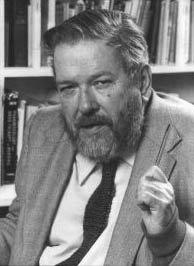George Grant | |
|---|---|
 | |
| Born | George Parkin Grant 13 November 1918 |
| Died | 27 September 1988 (aged 69) Halifax, Nova Scotia, Canada |
| Spouse |
Sheila Allen (m. 1947) |
| Academic background | |
| Alma mater | |
| Thesis | The Concept of Nature and Supernature in the Theology of John Oman (1950) |
| Influences | |
| Academic work | |
| Discipline | |
| School or tradition | |
| Institutions | |
| Main interests | |
| Notable works | Lament for a Nation (1965) |
| Influenced | |
George Parkin Grant OC FRSC (13 November 1918 – 27 September 1988) was a Canadian philosopher, university professor and social critic. He is known for his Canadian nationalism, a political conservatism that affirms the values of community, equality and justice and his critical, philosophical analysis of the social and political effects of limitless technological progress. As a practising Christian, Grant conceived of time as the moving image of an eternal order illuminated by love.[7]
Many of his writings express a complex meditation on and dialogue with the great thinkers of Western civilization including the "ancients" such as Plato, Aristotle, and Augustine of Hippo as well as "moderns" such as Georg Wilhelm Friedrich Hegel, Friedrich Nietzsche, Martin Heidegger, Leo Strauss, James Doull, Simone Weil and Jacques Ellul. Grant distinguished between civilizations of antiquity in which people believed that sacred stories, rituals and myths revealed universal order and the civilizations of modernity that came into being with the rise of Western science, the rapid development of industrial technologies and the prevailing belief that human beings are free to create (or will) their own order.[8][9][10]
"We can hold in our minds the enormous benefits of technological society, but we cannot so easily hold the ways it may have deprived us," Grant wrote, "because technique is ourselves." He argued that the technological society has destroyed "the very systems of meaning" along with the language that expressed the highest human purposes. "Our vision of ourselves as freedom in an indifferent world could only have arisen in so far as we had analyzed to disintegration those systems of meaning, given in myth, philosophy and revelation, which had held sway over our progenitors."[11]
Grant vigorously opposed euthanasia, which he defined as "deliberately causing the death of someone who is not already dying," and abortion, except where the mother's life is in danger, or in psychologically traumatizing instances of rape, especially of young girls. In the case of abortion, he argued that a woman's right to choose one "can only be made law by denying to another member of our species the right to exist" and, in the case of euthanasia, he wrote that rather than killing patients, doctors can alleviate their pain and fear. He warned that legal access to euthanasia (or assisted suicide) and abortion on demand could result in the killing of people considered less human or less valuable such as the aged, handicapped or the infirm.[12]
Although he is considered the main theoretician of red Toryism, he expressed dislike of the term when applied to his deeper philosophical interests, which he saw as his primary work as a thinker.[13] Recent research on Grant uncovers his debt to a neo-Hegelian idealist tradition, Canadian idealism, that had a major influence on many Canadian scholars and Canadian political culture more broadly.[14]
- ^ Christian 1993, p. 228; Forbes 2007, pp. 116, 126.
- ^ Christian 1993, p. 228.
- ^ Grant 2009, p. 265.
- ^ French, Orland (12 January 2002). "Lives of the Intellectual Saints". The Globe and Mail. Toronto. Retrieved 22 February 2018.
- ^ Fawcett 2021.
- ^ Heidebrecht, Paul C. (2006). "A Prescription for the Ills of Modernity? Understanding A. James Reimer's Approach to Theology". The Mennonite Quarterly Review. 80 (2). Retrieved 4 October 2019.
- ^ Christian & Grant 1998, pp. 3–31.
- ^ Christian & Grant 1998, pp. 8–32.
- ^ Babe, Robert (2000). Canadian Communication Thought: Ten Foundational Writers. University of Toronto Press. pp. 182–206. ISBN 9780802079497.
- ^ Forbes 2011; Kinzel 2009, pp. 10–11, 15.
- ^ Grant, George (1969). Technology and Empire: Perspectives on North America. Toronto: House of Anansi. p. 137. ISBN 088784605X.
- ^ Grant, George (1986). Technology & Justice. Toronto: House of Anansi. pp. 103–130.
- ^ Christian 2006.
- ^ Meynell 2011, pp. 107–108.